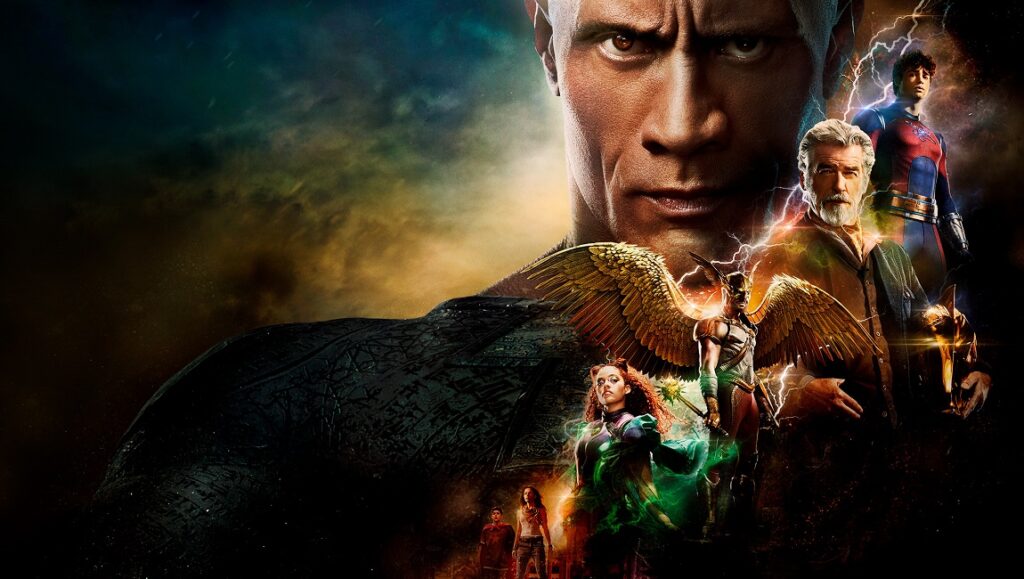Black Adam entertains, but only if you view it on autopilot and disregard its lack of thematic subtlety.
As Black Adam crash-lands into theaters this Friday, the DC Extended Universe finds itself surprisingly well-positioned to make a splash. 2022 will be remembered for many things, and one of its footnotes in history may be the revelation that this was when we all began to acknowledge the erosion of the Marvel Cinematic Universe’s juggernaut status. Before Disney can engineer the operatic heights of its next cosmic crossover event, it must first repopulate the verse with new IP while maneuvering its established pieces around the board. And it’s in this period of stasis that this Dwayne Johnson-led DCEU vehicle arrives, hoping to shake up the hierarchy of power both in DC and in the box office. Black Adam won’t break the Internet or anything. It’s much too clumsy, loud, transparent and one-note to be considered a “good” film in a traditionally critical sense. But that doesn’t mean there isn’t fun to be had.
The story starts off several millennia past in the made-up city of Kahndaq, where its tyrannical king forces his subjects to mine the lands for the magical phlebotinum he needs to assemble a demonic McGuffin crown of great power. A spirited slave boy named Hurut (Jalon Christian) inspires a revolt against the ruler, and before he’s struck down he’s granted god-like abilities. Now the empowered Teth-Adam, he kills the king and liberates his people. Fast forward to the present-day and Kahndaq is once again oppressed, this time by the high-tech paramilitary crime organization Intergang. Archaeologist Adrianna Tomaz (Sarah Shahi) and her colleagues locate the long-lost McGuffin crown and, in a bid to escape Intergang forces, unwittingly awaken Teth-Adam (Dwayne Johnson). He promptly annihilates all the baddies, showing such destructive capability and disregard for sentient life that the Justice Society of America (JSA) is tasked with bringing him to heel.
Anybody buying a ticket to see Black Adam is most likely theater-bound for one reason and one reason only: to revel in the Rock portraying a hammy, mass-murdering flying brick. On paper, this should be the role of a lifetime. Johnson plays Adam not with ferocity but with a bit of a detached, fish-out-of-water quirkiness that sands down his rough, antiheroic edges. Admittedly it works now and then, providing the character comedic avenues not reliant on the mile-a-minute quip-fest Marvel has made an industry staple of. Other times the dryness of the humor is so underdone it takes a moment to even register that the script was attempting to be funny. The character’s traumas are buried deep within, only unearthed during a midpoint exposition dump, leaving Johnson with little to do in the way of emotional range. Whether you’re invested in Teth-Adam or not entirely depends on how captivating you find the brand that is the Rock, and seeing this screen icon imbued with Kryptonian-level abilities catching rockets, smashing helicopters and punch-fighting CGI bird-men does, in spurts, provide the rush of power-fantasy excitement that explains why people show up to these things to begin with. Johnson is a showman; what his performances lack in depth, they earn back in their disarming absence of self-seriousness. Here is probably the grandest stroke yet of his pop-cultural preeminence, totemic of the idea that movie stars do still exist, painfully mediocre movies be damned.
Of course, Johnson isn’t the caliber of performer to carry a $200-million production all on his own. Enter the JSA to pick up some of the slack. Hawkman (Aldis Hodge) leads the JSA with the patriotic swagger of a headstrong, All-American quarterback. Noah Centineo’s here as Atom Smasher, the new kid bringing a dose of Peter Parker energy to the ensemble. Cyclone (Quintessa Swindell) has the least to do outside of providing support and taking out mooks. Pierce Brosnan’s Doctor Fate rounds them out, his mystical powers conveniently functioning as a plot device at the eleventh hour. Combined, they don’t hold a candle to Teth-Adam or the film’s ultimate foe, feeling like a bootleg Avengers squad to add some variety to the action setpieces. A few Kahndaqi citizens, Adrianna Tomaz included, have roles to play, particularly her son Amon Tomaz (Bodhi Sabongui), who’s a freedom fighter and very obvious analog to Hurut, and also guilty of some truly cringeworthy line deliveries.
All that being said, what really holds Black Adam back is its script and lack of thematic subtlety. Between exposition and jokes, there’s little room left over for character moments that aren’t in service of the plot. The sheer amount of information that needs to be established for the movie to be sensible leads to the actors working through convoluted lines of dialogue, some of which come out so flatly you’d think your Alexa could do a better job. The film, perhaps taking inspiration from its vaguely North African setting, tries to manage some politically salient concepts. The conflict between the Kahndaqi populace and Intergang introduces opportunities to unpack anti-imperialist ideas, particularly when the JSA arrives to do its business without local sanction. While amusing at first, the act is more than tired around the second or third time a character preaches about liberation with all of the nuance of a middle-schooler’s History report. Without the flash of the presentation (some dynamic camera moves, rich lighting, VFX mayhem that does carry weight), the failures of the writing could’ve truly sunken this one. But the flash is there, and so long as you’re willing to set your brain to autopilot (and perhaps wear earplugs, this movie is loud) you won’t be getting a good film, but you might be able to eke out a good enough time.


Comments are closed.